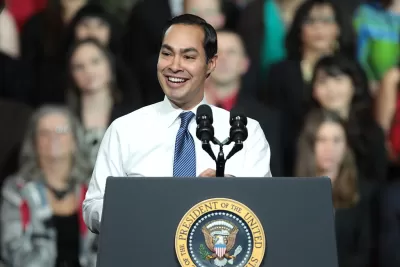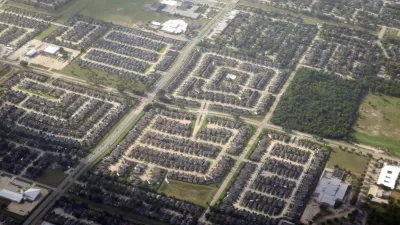Rules protecting minorities' access to housing have been strengthened under the Obama administration. That progress could be lost under a HUD Secretary who opposes Fair Housing altogether.

Fair-housing rules will soon be in the hands of a developer who discriminated against black tenants—President-elect Trump—an anxious CityLab piece by Kriston Capps notes.
Some of Trump’s reported contenders for HUD Secretary are firmly opposed to policies that aim to expand access to good housing in a field historically stacked against people of color and the working class. Kriston Capps notes especially Robert Astorino, who has in some ways built a career out of attacking housing rules. Retired neurosurgeon and former Republican presidential candidate Ben Carson, who in 2015 called fair housing a "noose," has this week been confirmed as Trump's pick for the position.
In a Housing Department governed by these beliefs, recent policy changes meant to strengthen what has until now been weak federal anti-discrimination housing policy could be targeted for revision or even repeal.
The first is Affirmatively Furthering Fair Housing—already a target of conservative pushback—which requires cities to assess their own low-income housing practices and compliance with the Fair Housing Act before qualifying for federal housing funds.
Aspects of AFFH have yet to be implemented: the Assessment of Fair Housing tool for state governments, for example, will not receive final approval by the Office of Management and Budget before January 20. If AFFH is to succeed, President-elect Trump will have to finish what President Obama started.
The second is a Supreme Court decision affirming that "disparate impact" of housing policies on different racial groups is a form of discrimination prohibited by the Fair Housing Act, regardless of whether it is an explicit goal.
Trump's pick could undermine this policy even if the Supreme Court doesn't actually overturn its decision—by simply not enforcing it. "The U.S. Department of Justice will be as pivotal to protecting fair-housing standards as HUD," Capps notes.
FULL STORY: What's at Stake in Trump's Pick to Lead HUD

Alabama: Trump Terminates Settlements for Black Communities Harmed By Raw Sewage
Trump deemed the landmark civil rights agreement “illegal DEI and environmental justice policy.”

Study: Maui’s Plan to Convert Vacation Rentals to Long-Term Housing Could Cause Nearly $1 Billion Economic Loss
The plan would reduce visitor accommodation by 25% resulting in 1,900 jobs lost.

Why Should We Subsidize Public Transportation?
Many public transit agencies face financial stress due to rising costs, declining fare revenue, and declining subsidies. Transit advocates must provide a strong business case for increasing public transit funding.

Wind Energy on the Rise Despite Federal Policy Reversal
The Trump administration is revoking federal support for renewable energy, but demand for new projects continues unabated.

Passengers Flock to Caltrain After Electrification
The new electric trains are running faster and more reliably, leading to strong ridership growth on the Bay Area rail system.

Texas Churches Rally Behind ‘Yes in God’s Back Yard’ Legislation
Religious leaders want the state to reduce zoning regulations to streamline leasing church-owned land to housing developers.
Urban Design for Planners 1: Software Tools
This six-course series explores essential urban design concepts using open source software and equips planners with the tools they need to participate fully in the urban design process.
Planning for Universal Design
Learn the tools for implementing Universal Design in planning regulations.
Caltrans
Smith Gee Studio
Institute for Housing and Urban Development Studies (IHS)
City of Grandview
Harvard GSD Executive Education
Toledo-Lucas County Plan Commissions
Salt Lake City
NYU Wagner Graduate School of Public Service





























